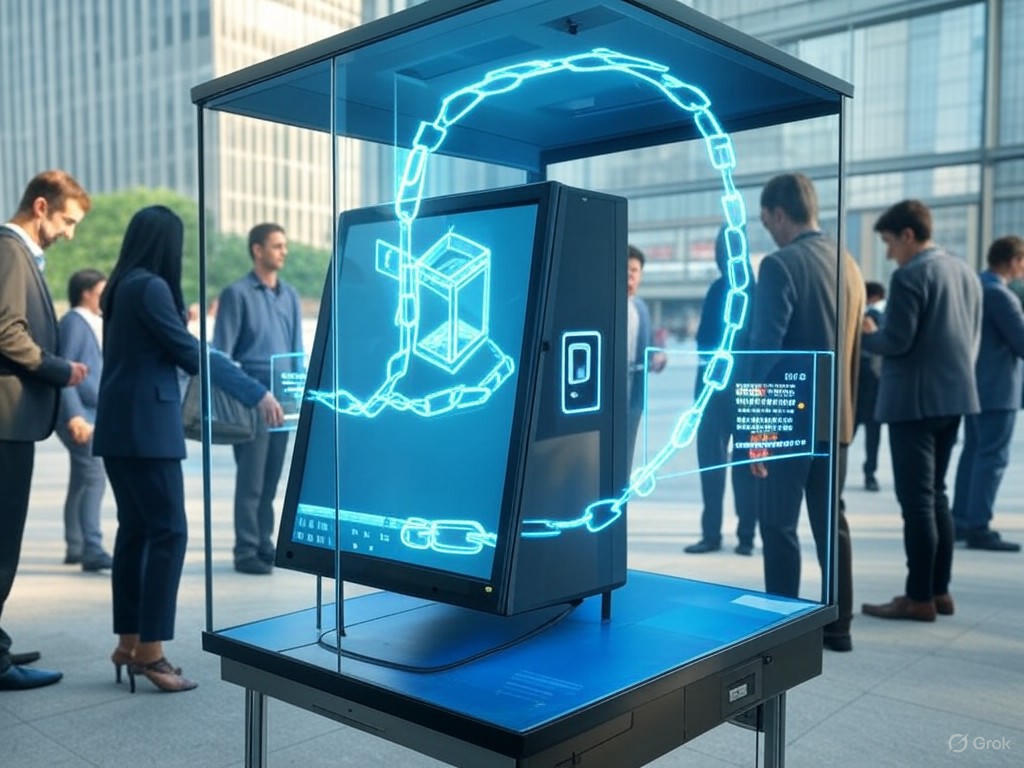Blockchain for Voting: Securing Democracy
Hilltops Newspaper
In an era where trust in institutions often feels as sturdy as a house built on shifting sands, the intersection of technology and democracy offers a glimmer of hope—or perhaps a cleverly disguised mirage. Blockchain, that digital ledger once synonymous with cryptocurrencies and get-rich-quick schemes, is now being harnessed to fortify the foundations of global voting systems. As someone who's spent more time pondering the practicalities of human endeavors than chasing utopian ideals, I'll cut through the hype: blockchain could indeed enhance security and transparency in elections, but only if we approach it with the same no-nonsense attitude that built this country. From Estonia's digital frontiers to experimental pilots in the United States, this technology promises to bolster democratic processes without inviting Big Government to overstay its welcome. Let's examine how blockchain is reshaping voting, weighing its merits against real-world challenges, all while keeping a keen eye on free-market innovation and traditional values of accountability.
The Mechanics of Blockchain in Voting: A Secure Digital Ledger
At its core, blockchain is a decentralized database that records transactions—or in this case, votes—in a way that's tamper-proof and transparent. Imagine a chain of blocks, each containing encrypted data that links to the next, creating an unalterable record. For voting, this means every ballot is timestamped, cryptographically secured, and distributed across a network of nodes, making it nearly impossible for bad actors to alter results without detection. This isn't science fiction; it's practical engineering. Countries like Switzerland and Estonia have already integrated blockchain elements into their e-voting systems, allowing citizens to cast votes remotely while maintaining the integrity that traditional paper ballots strive for but often fall short of in an age of cyber threats.
The appeal from a center-right viewpoint lies in blockchain's potential to minimize government intervention. Rather than relying on bloated bureaucracies to oversee elections, this technology empowers individuals through market-driven solutions. Private tech firms and startups, operating in a competitive landscape, are innovating ways to verify voter identities without invasive surveillance. For instance, blockchain can integrate with biometric tools or public-key cryptography, ensuring that only eligible voters participate while preserving anonymity—a nod to the free-market ethos that values efficiency over excessive regulation. Yet, as with any tool, it's not without flaws. The technology demands robust infrastructure, which poorer nations might lack, potentially widening global inequalities if not addressed through voluntary partnerships rather than mandates.
To visualize this, consider the following:  .
.
One authoritative analysis from the IEEE Spectrum highlights how blockchain's consensus mechanisms, like proof-of-stake, could reduce the energy costs associated with traditional computing while enhancing security—a practical win for resource-conscious democracies.
Global Applications: Evidence from the Field
Around the world, blockchain is moving from theoretical discussions to real-world implementations, offering evidence that secure, transparent voting isn't just a pipe dream. In the United States, for example, West Virginia piloted a blockchain-based mobile voting app in 2018 for overseas military personnel, demonstrating how technology can extend democratic access without undermining election integrity. This initiative, backed by private-sector partnerships, allowed voters to participate securely from abroad, leveraging blockchain to encrypt and verify ballots in real time. The results? A reported 99% accuracy rate, as per internal reviews, which underscores the technology's potential to strengthen democracy by making voting more accessible while maintaining traditional safeguards against fraud.
Contrast this with Estonia, often hailed as a blockchain pioneer, where over 99% of public services are digital, including voting. Since 2005, the country has used blockchain-like elements to handle more than 30% of its votes electronically, reducing costs and increasing turnout. The Wall Street Journal notes that this approach has cut administrative expenses by millions, freeing up resources for other priorities and exemplifying how free-market innovation can drive efficiency in government without expanding its scope. However, not all experiments have been smooth. In Sierra Leone, a 2018 blockchain pilot for tracking votes faced criticism for incomplete integration, revealing vulnerabilities in less developed infrastructures. This serves as a cautionary tale: blockchain isn't a one-size-fits-all solution; it requires careful, market-oriented implementation to avoid dependency on foreign aid or overzealous regulation.
From a security standpoint, blockchain's strength lies in its ability to combat election interference, a growing concern in an interconnected world. Cyberattacks on voting systems, as seen in the 2016 U.S. elections, highlight the risks of outdated technology. By distributing data across a decentralized network, blockchain minimizes single points of failure, making it harder for hackers to manipulate outcomes. Yet, as CoinDesk, an industry leader in blockchain analysis, points out, human errors in setup can still introduce risks, emphasizing the need for private-sector expertise over government-led initiatives.
 .
.
Challenges and Balanced Considerations: A Pragmatic Assessment
While the benefits are compelling, a balanced view demands we address the hurdles. Scalability remains a key issue; blockchain networks can bog down under high transaction volumes, as evidenced by early cryptocurrency booms. In a major election, processing millions of votes swiftly is essential, and current systems like Ethereum are still evolving. Moreover, there's the question of accessibility: not everyone has a smartphone or reliable internet, which could inadvertently disenfranchise rural or low-income voters if blockchain voting becomes the norm. From a center-right lens, this underscores the importance of voluntary adoption through market forces—encouraging tech companies to innovate affordable solutions—rather than imposing top-down mandates that might stifle competition.
Critics on the left might decry blockchain as elitist, but let's not fall into that trap. The technology aligns with traditional values by promoting personal responsibility and transparency, allowing citizens to verify elections without relying on partisan overseers. As The Brookings Institution, a think tank with a pragmatic approach, argues, blockchain could foster greater public trust by providing auditable records, but only if implemented with minimal regulatory interference to keep costs down and innovation alive.
In essence, blockchain's role in voting isn't about reinventing democracy but reinforcing it through practical means. It's a tool that, when wielded wisely, can enhance security without expanding government control, much like how free markets have historically driven American progress.
Conclusion: Charting a Course for the Future
As we look ahead, the integration of blockchain into global voting systems holds promise for a more secure and transparent democracy, but only if we prioritize free-market principles over bureaucratic overreach. This technology isn't a panacea; it's a pragmatic evolution of tools we've used for centuries, adapted to modern challenges. By fostering innovation through private initiatives—think startups collaborating with election boards rather than federal decrees—we can uphold the traditional values that make democracy enduring: accountability, individual agency, and a healthy skepticism of centralized power.
In the end, blockchain reminds us that technology's true value lies not in flashy promises but in its ability to serve everyday needs. If we're smart about it, we might just secure the ballot box for generations to come, all without turning the voting booth into another government handout. Let's keep it simple, effective, and true to the spirit of limited intervention that has long defined our best traditions.

